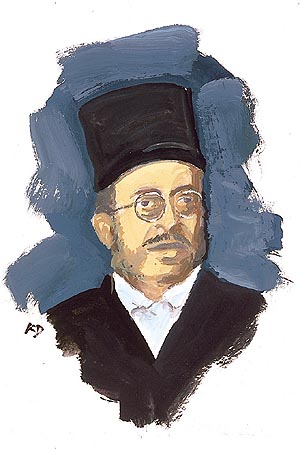IF Bombay or Mumbai is the commercial capital of India, one person that it ought to be grateful to is the Right Honourable Sir Pherozeshah Mehta, the quintessential gentleman, debater, speaker, and administrator. In 1877, a volunteer corps comprising mainly Europeans was set up to improve civic conditions in Bombay. Sir Pherozeshah got up and said it was "not advisable to resolve on the formation of a volunteer corps composed exclusively of Europeans at a public meeting of the inhabitants of Bombay".
 Owing to his untiring work for the people of Bombay, the Bombay Presidency Association was established in 1885 with Pherozeshah Mehta as its president, a post that he held all his life. The same year the Indian National Congress held its first sitting in Bombay under the presidency of W. C. Bannerjee. Pherozeshah Mehta joined Congress and became one of its guiding forces. Such was the impact of his towering personality and genius on his associates that Gopal Krishana Gokhale once remarked: "Mr Mehta, to a great extent, is a happy combination of the independence and strength of character of the late Mr Mandlik, the lucidity and culture of Mr Telang and the originality and wide grasp of Mr Ranade."
Owing to his untiring work for the people of Bombay, the Bombay Presidency Association was established in 1885 with Pherozeshah Mehta as its president, a post that he held all his life. The same year the Indian National Congress held its first sitting in Bombay under the presidency of W. C. Bannerjee. Pherozeshah Mehta joined Congress and became one of its guiding forces. Such was the impact of his towering personality and genius on his associates that Gopal Krishana Gokhale once remarked: "Mr Mehta, to a great extent, is a happy combination of the independence and strength of character of the late Mr Mandlik, the lucidity and culture of Mr Telang and the originality and wide grasp of Mr Ranade."
Son of a successful businessman, Pherozeshah Mehta was among the first batch of young Indians to receive first class European education. He studied for three years at Lincoln's Inn in England, where he came in contact with another great Indian, Dadabhai Naoroji, and got involved in the activities of the London Indian Society and the East Indian Association. The main aim of these societies was to create a healthy public opinion in England. It was during this phase that he became a great friend of W. C. Bannerjee.
At one of the meetings of the East Indian Association, Mehta said: "An elementary knowledge of reading and writing and arithmetic however widely diffused, would no more be able to break and loosen the hard ground of traditional prejudice than children's hatches of paper, however numerous, would suffice to clear a jungle."
In order to stem the growth of the nationalist movement in India, Lord Lytton decided to censor the vernacular press. Pherozeshah Mehta vehemently opposed the move. He believed that the press should be as free as possible, and that it was the fundamental duty of the government to educate the masses. "England must raise India to her own level, or India will drag her down to hers," he warned.
http://www.tribuneindia.com/2000/20000130/spectrum/main2.htm
No comments:
Post a Comment